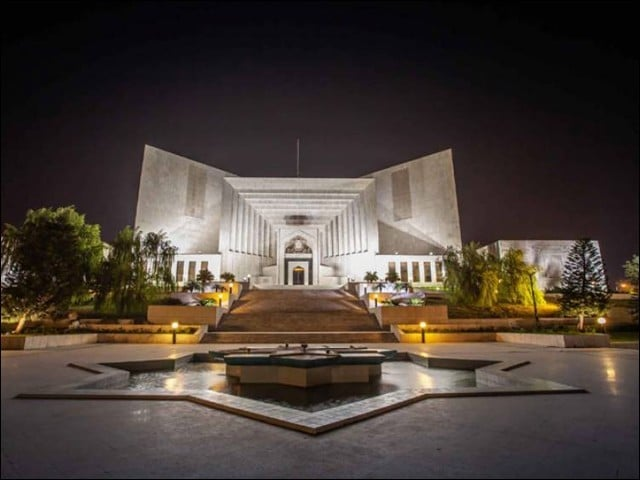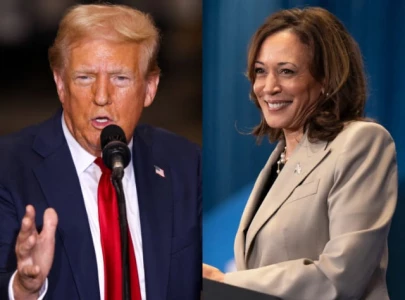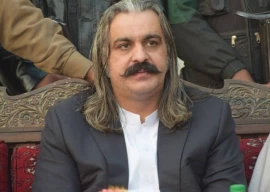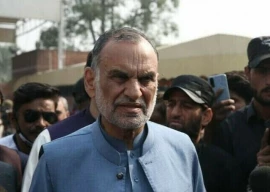
The Supreme Court (SC) directed the Election Commission of Pakistan (ECP) on Thursday to confer with the president and finalize election date after electoral body proposed February 11 as polling day.
It further directed the ECP to consult with the president today, instructed the attorney general of Pakistan to facilitate the meeting and directed the relevant bodies to submit the final date in court tomorrow (Friday).
The announcement of the finalized date for general elections will be made from the apex court, remarked Chief Justice of Pakistan (CJP) Qazi Faez Isa.
A three-member bench led by CJP Isa and comprising Justice Aminuddin Khan and Justice Athar Minallah resumed hearing on pleas moved by the Supreme Court Bar Association (SCBA), Pakistan Tehreek-e-Insaf and Ibadur Rehman Lodhi seeking elections within the 90-day time period after the dissolution of the national and provincial assemblies.
The court was informed that the ECP intends to hold elections on February 11 after completing the entirety of its delimitation and preparation process by January 29. It further apprised that it aims to hold the polls on a Sunday so as to ensure maximum public participation, indicating February 4 and February 11, as potential dates. The ECP has proposed the latter Sunday.
The court issued its short order seeking immediate finalization of the date and warned that the relevant authorities would be bound to the date submitted before it tomorrow.
ECP proposes Feb 11 as poll day
During the proceedings on Thursday, the ECP's counsel Sajeel Swati apprised the apex court that polls would be held on February 11. He further apprised the court that the entirety of its process would be completed by January 29.
At this, CJP Isa remarked that the apex court would bind the ECP to conduct polls on the final date it is issuing. "We will not carry out the ECP's work, but will bind the authority to stick to the date issued."
CJP Isa directed the ECP to finalize the date in consultation with the president and apprise the court.
Read SC questions utility of interim govts
On the CJP's insistance for a clear stance on polls during today's (Thursday) hearing, the ECP counsel apprised that there was a 54-day schedule after the delimitation process. "All arrangements, including the drawing of constituencies will be completed by January 29," said Swati.
He apprised the court that the ECP will publish the list of constituencies on December 5 after completing delimitations by November 30, as stated earlier, then leaving time for redressal if needed and preparations.
"We decided that elections will be held on Feb 11, which is the second Sunday [after Jan 29]," he informed the court.
CJP Isa inquired whether President Dr Arif Alvi was taken on board to which Swati replied "we are not bound to take the president on board".
Irked, the CJP remarked, "both the president and ECP are Pakistanis. Why is the ECP hesitant to consult with the president?” He directed the electoral body to confer with Dr Alvi today.
The court then broke for a recess awaiting a final date for the polls by the ECP.
However, after a half-hour break, Swati apprised the bench that the electoral body would consult with president later today.
“Knock his door even if he doesn’t call you,” remarked Justice Isa said and then instructed AGP Mansoor Usman Awan to facilitate the consultation and stay on board during it.
"SC wants polls to be held without any arguments," remarked the CJP. He added that the apex court only sought a resolution to the matter and did not want to get stuck in any technicalities. He reiterated that the final election date would have to be implemented.
Later, the bench issued its written order summarizing the ECP's stated schedule for polls and directing the electoral body to inform the court of the final date on Friday after consultation with the president.
The hearing
Earlier, at the outset of the hearing, Naek had appeared before the court and sought to become a respondent in the case. The judges consented to his request after PTI counsel Barrister Ali Zafar stated he held no objections to it.
Beginning arguments, the PTI counsel contended that the polls be held within 90 days.
However, CJP Isa interjected by observing that this request had now become ineffective.
When Barrister Zafar maintained that his argument was related to a fundamental right, the CJP inquired whether the counsel just wanted elections now. To this, the PTI counsel replied in the affirmative.
The CJP then asked if anyone would oppose this. To this, both the Attorney General of Pakistan (AGP) Mansoor Usman Awan and the PTI counsel replied in the negative.
Resuming arguments, the PTI lawyer referred to Articles 58 and 224, pertaining to the dissolution of National Assembly and time of polls and by-polls, respectively. He argued that without polls, neither the parliament can be run nor can laws be formed.
Read more SC shows guts as Bandial retires
He contended that giving the polls date was also mentioned in the Constitution while maintaining that there was a difference between issuing a schedule for polls and announcing the election date.
Zafar apprised the court that the law ministry believes the president cannot give date for the polls and stated that based on the 90-day time period, polls should be held on November 7.
In late August, President Dr Arif Alvi had invited CEC Sikandar Sultan Raja to discuss the fixing of the election date within the 90-day constitutional deadline. However, the ECP had rejected the president's request to resolve the matter claiming his input was not needed.
Later, the interim law ministry told Dr Alvi that the assemblies were dissolved on the recommendation of the prime minister and the legislation approved by parliament did not authorise him to give the date of the polls. It apprised that after recent amendments to the electoral law, the ECP held the sole authority to set the date for polls.
On Thursday's hearing, Justice Minallah inquired why it had taken the president so long to write to the ECP whereas the CJP observed that the text of the letter in question was "vague".
When CJP Isa inquired whether the president had approached the apex court for an opinion on the matter, the PTI counsel replied in the negative.
When the bench noted the delay in the president's letter to the ECP, Zafar maintained that in his opinion the president had fulfilled his responsibility.
"The command of the Constitution is very clear that the president had to give the date [for elections], there is no disagreement in it,” remarked Justice Minallah at one point.
"Whoever wants to disagree can continue doing so," said CJP Isa, adding that the court could take judicial notice as well.
Justice Minallah remarked that there would not have been any objections had the president given the election date on the day the National Assembly was dissolved i.e. August 9.
Similarly, the CJP observed that the president's letter to the ECP could not have been sent on the "last day".
Further read President doesn't see elections taking place in Jan
The CJP inquired from the counsel what he sought from the court now. "Do you want us to direct the president to give a date? The president says he took advice from so and so. Can this court now issue a writ against the president?” asked the top judge.
The CJP further inquired whether the apex court could give the date for polls while commenting on the mechanism involved for conducting elections.
Meanwhile, Justice Minallah referred to Article 98, which pertains to the conferring of functions on subordinate authorities, and stated that the Constitution was clear on the court's role in the matter.
When asked whether the ECP ever stated that the president should give the date for polls, Zafar apprised that the electoral body had maintained that the authority to announce the date lay solely with it. He asserted that there was a need to look at the SC's role in the matter.
“Can we go against the president and give a date for polls ourselves?” asked CJP Isa, observing that the Constitution gave the top court the authority to do so.
Barrister Zafar said that such a measure had been taken before. However, Justice Minallah remarked that the question under discussion currently was different.
Stating that holding elections was "not a problem" but good, CJP Isa asked the PTI counsel why Dr Alvi, who belongs to the PTI, wasn't directed by the party to announce a date for elections.
At one point during the hearing, Justice Khan remarked that Zafar's argument indicated that the president had deviated from the Constitution.
“Prima facie the president, ECP and government are all responsible,” said Justice Minallah. “The question now is what will be the result of this,” he remarked, stressing that polls must be held on time.
Justice Minallah further observed that each passing day after the stipulated 90-day period to hold polls ended, was in "violation of the Constitution".
Case history
At the last hearing, CJP Isa had remarked that "all of us want elections, but a wrong impression is being created that we are not interested".
The court had issued notices to the government of Pakistan and Election Commission of Pakistan (ECP), which has ruled out polls this year citing the need for fresh delimitation of constituencies given the approval of the 2023 digital census. Later, the electoral body stated that polls would be likely held in January 2024 but has yet to announce a final date. The bench had noted that they could fix the date for polls within 10 days.
The petitioners in this case challenged the August 7 notification issued by the Council of Common Interests (CCI) besides amendments to Section 57 of the Elections Act, which empower the chief election commissioner to announce the date for polls.
The petitioners have moved the court to direct the relevant authorities to hold polls within 90 days as mandated under Article 224.
The National Assembly was dissolved on August 9, 2023, three days short of completing its constitutional term of five years. Article 224 of the Constitution of Pakistan stipulates that elections be held within 90 days of the dissolution of assembly, which in this case would have meant general elections in November 2023.
However, under Section 17 of the Elections Act, the ECP is bound to delimit constituencies after the official publication of each fresh census.





1730793476-0/bella-(1)1730793476-0-165x106.webp)



1730789969-0/Untitled-design-(98)1730789969-0-270x192.webp)






1730706072-0/Copy-of-Untitled-(2)1730706072-0-270x192.webp)
COMMENTS
Comments are moderated and generally will be posted if they are on-topic and not abusive.
For more information, please see our Comments FAQ